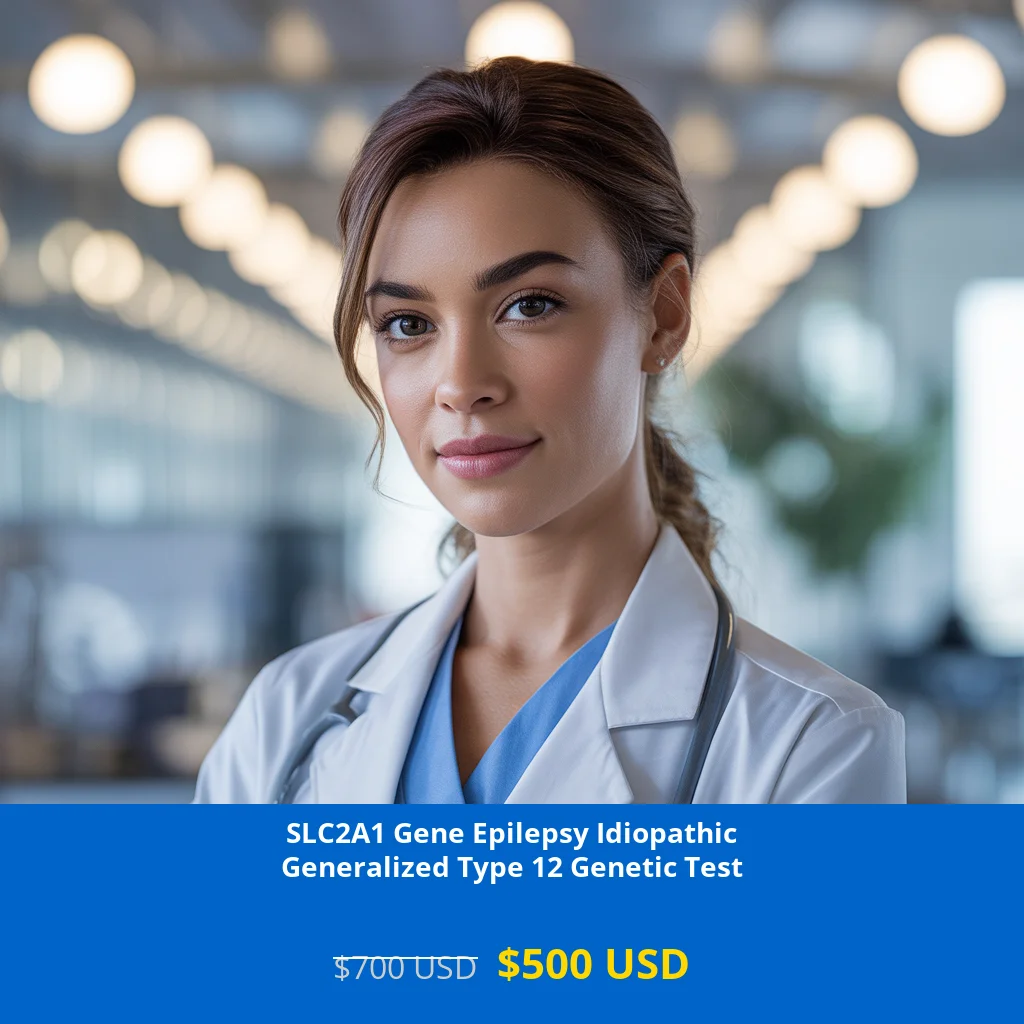SLC2A1 Gene Epilepsy Idiopathic Generalized Type 12 NGS Genetic DNA Test
Understanding SLC2A1 Gene Epilepsy and GLUT1 Deficiency Syndrome
The SLC2A1 Gene Epilepsy Idiopathic Generalized Type 12 NGS Genetic DNA Test represents a breakthrough in neurological genetic testing, specifically designed to identify mutations in the SLC2A1 gene that cause GLUT1 deficiency syndrome. This rare genetic disorder affects glucose transport to the brain, leading to various neurological symptoms including epilepsy, developmental delays, and movement disorders. Early and accurate diagnosis through this advanced genetic test is crucial for implementing effective treatment strategies that can significantly improve patient outcomes and quality of life.
What This Advanced Genetic Test Detects
Our comprehensive NGS-based genetic test specifically targets the SLC2A1 gene, which encodes the glucose transporter protein type 1 (GLUT1). This protein is essential for transporting glucose across the blood-brain barrier, and mutations in this gene disrupt normal brain glucose metabolism. The test identifies:
- Point mutations, deletions, and insertions in the SLC2A1 gene
- Variants associated with early-onset absence epilepsy
- Mutations causing movement disorders and developmental delays
- Genetic changes responsible for GLUT1 deficiency syndrome spectrum
- Both inherited and de novo genetic mutations
Who Should Consider SLC2A1 Genetic Testing?
This specialized genetic test is recommended for individuals presenting with specific neurological symptoms, particularly when standard epilepsy treatments prove ineffective. Consider testing if you or your child experiences:
- Early-onset seizures beginning in infancy or early childhood
- Absence seizures that don’t respond to conventional anti-epileptic medications
- Developmental delays or intellectual disability of unknown cause
- Movement disorders including ataxia, dystonia, or spasticity
- Paroxysmal exercise-induced dyskinesia
- Family history of similar neurological conditions
- Unexplained neurological symptoms with normal brain imaging
Significant Benefits of SLC2A1 Genetic Testing
Undergoing SLC2A1 genetic testing provides numerous advantages for patients and families affected by neurological disorders:
- Accurate Diagnosis: Provides definitive identification of GLUT1 deficiency syndrome
- Targeted Treatment: Enables implementation of ketogenic diet therapy, the gold standard treatment
- Family Planning: Offers genetic counseling opportunities for family members
- Prognostic Information: Helps predict disease progression and potential complications
- Reduced Diagnostic Odyssey: Eliminates years of uncertainty and misdiagnosis
- Personalized Care: Guides development of individualized treatment plans
Understanding Your Genetic Test Results
Our comprehensive genetic counseling services help you interpret your SLC2A1 test results with clarity and confidence:
- Positive Result: Indicates a mutation in the SLC2A1 gene, confirming GLUT1 deficiency syndrome diagnosis
- Negative Result: Suggests absence of detectable SLC2A1 mutations, though other genetic causes may be considered
- Variant of Uncertain Significance: Identifies genetic changes requiring further clinical correlation
- Carrier Status: Determines if individuals carry the mutation without showing symptoms
All results are accompanied by detailed explanations and recommendations from our certified genetic counselors to ensure you fully understand the implications for treatment and family planning.
Test Pricing and Availability
| Test Component | Price (USD) |
|---|---|
| SLC2A1 Gene Epilepsy Idiopathic Generalized Type 12 NGS Genetic DNA Test | $700 |
| Discount Price | $500 |
Nationwide Testing Availability
We proudly offer SLC2A1 genetic testing services across the United States, with convenient locations in all major metropolitan areas including New York City, Los Angeles, Chicago, Houston, Phoenix, Philadelphia, San Antonio, San Diego, Dallas, San Jose, Austin, Jacksonville, Fort Worth, Columbus, San Francisco, Charlotte, Seattle, Denver, Washington DC, Boston, and many more. Our network of certified collection centers ensures accessible testing for patients nationwide.
Take Control of Your Neurological Health Today
Don’t let unexplained neurological symptoms control your life. The SLC2A1 Gene Epilepsy Idiopathic Generalized Type 12 NGS Genetic DNA Test provides the answers you need to make informed decisions about your health. With results available in 3-4 weeks and comprehensive genetic counseling included, this test represents a crucial step toward understanding and managing genetic epilepsy conditions.
Call or WhatsApp us today at +1(267) 388-9828 to schedule your genetic testing appointment or to speak with our genetic counseling team. Take the first step toward clarity and effective treatment for neurological disorders.







